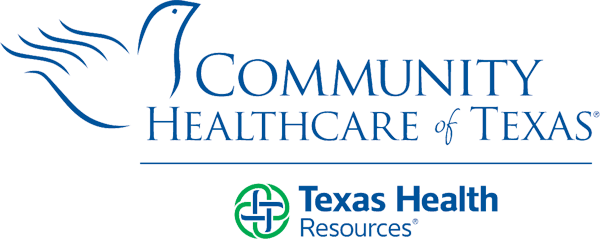20 Most Commonly Asked Questions about Hospice

These 20 most commonly asked questions will help you navigate hospice so that your family is equipped to make the best decisions.
1. When should a decision about entering a hospice program be made, and who should make it?
The earlier you call us, the more Community Healthcare of Texas can do to support you and your family. At any time during a life-limiting illness, it’s appropriate to discuss all of a patient’s care options, including hospice. As with all medical issues, the patient has complete control regarding the decision for their healthcare. Community Healthcare of Texas staff members are available 24/7 to discuss decisions with the patient, family, and physician.
2. Should I wait for our physician to raise the possibility of hospice, or should I raise it first?
The patient and family should feel free to discuss hospice care at any time with their physician, other health care professionals, clergy, or friends. A patient or family member can ask their physician for a referral to Community Healthcare of Texas.
3. What if our physician doesn’t know about hospice?
Most physicians have some understanding of hospice care. If your physician wants more information, they can simply call Community Healthcare of Texas, and we will be happy to assist.
4. Can a hospice patient who shows signs of recovery be returned to regular treatment?
Certainly, if improvements in the patient’s condition occur and the disease seems to be in remission, they can be discharged from hospice and return to regular treatment as recommended by their physician.
5. What does the hospice admission process involve?
When hospice is requested, Community Healthcare of Texas will contact the patient’s physician to confirm they agree that hospice care is appropriate for the patient. Once the physician approves a referral, the paperwork process is simple. Community Healthcare of Texas has liaisons to meet with you to complete admission forms. The hospice election form reads that the patient understands that the care is comfort (aimed at pain relief and symptom control) rather than curative and outlines the multiple services available.
6. Are there any special equipment or changes I have to make in my home before hospice care begins?
Community Healthcare of Texas will assess your needs, recommend any necessary equipment and help make delivery arrangements. Often the need for equipment is minimal at first and increases as the disease progresses.
7. How many family members or friends does it take to care for patients at home?
There’s no set number. The hospice team will prepare families with a care plan. The plan will outline services and schedules for the family. Hospice staff visits regularly and are always available to answer questions and provide support.
8. Should someone be with the patient at all times?
This depends on the physical limitations of the patient. Your hospice team will assess the needs and offer recommendations for specific levels of care.
9. How difficult is caring for a dying loved one at home?
It’s never easy and sometimes can be quite difficult. At the end of a long, progressive illness, nights especially can be very long, lonely, and scary. Our hospice staff is available 24/7 to consult with the family and make night visits if requested.
10. What specific assistance does hospice provide for home-based patients?
A team of physicians, nurses, social workers, counselors, home health aides, clergy, therapists, and volunteers make up the hospice team to care for patients and families. Hospice will also provide medications, supplies, and equipment related to the diagnosis. Community Healthcare of Texas also provides inpatient care for the patient if needed or if respite care is necessary for the caregiver.
11. Does hospice do anything to make death come sooner?
No. At Community Healthcare of Texas, our role is to provide compassionate comfort care and symptom management to support quality of life – not to hasten the end of life.
12. Is the home the only place hospice care can be delivered?
No. Hospice services are delivered in a personal residence, assisted living facilities, long-term care centers, or one of our hospice inpatient facilities.
13. How does hospice manage pain?
Hospice doctors and nurses are up-to-date on the latest medications and devices for pain and symptom relief. Community Healthcare of Texas believes that emotional and spiritual pain are just as real and in need of attention as physical pain, so we address these as well. Counselors (including clergy) are available to assist family members as well as patients.
14. What is hospice’s success rate in battling pain?
Community Healthcare of Texas has a high success rate. Using combinations of medications, counseling, and therapies, most patients can attain a level of comfort that is acceptable to them.
15. Will medications prevent the patient from being able to talk or know what’s happening?
Usually not. The goal of hospice is to help patients be as comfortable and alert as possible by constantly consulting with the patient. Community Healthcare of Texas has been very successful in reaching this goal.
16. Is hospice affiliated with any religious organizations?
Hospice care is not an offshoot of any religion. While some religious organizations have started hospices, these hospices serve a broad community and do not require patients to adhere to any particular set of beliefs.
17. Is hospice care covered by insurance?
Hospice care is covered by Medicare, Medicaid, and most private health insurance. Families are often unaware of the extensive hospice coverage available to them through these providers. Community Healthcare of Texas will assist families in identifying eligible coverage for all hospice services.
18. If the patient is not covered by Medicare or any other health insurance, will hospice still provide care?
As the state’s largest not-for-profit hospice provider, Community Healthcare of Texas is dedicated to providing compassionate end-of-life care to anyone who needs our services regardless of their ability to pay.
19. Does hospice provide help to the family after the patient dies?
Through our Grief Care Services program, Community Healthcare of Texas provides ongoing support for family and friends for at least 13 months following the death of a loved one. We also offer, at no charge, bereavement and support groups for anyone in the community who has experienced the death of a family member, friend or loved one.
20. If the patient is eligible for Medicare, will there be any additional expenses?
Medicare, Medicaid, and most private health insurance cover all services and supplies related to a patient’s terminal illness.
Have additional questions? Contact us today at (800) 226-0373.
![Community Healthcare of Texas [logo]](https://www.chot.org/wp-content/themes/community-healthcare-of-texas-2019/images/logo.png)




